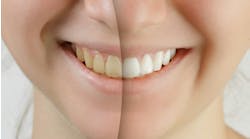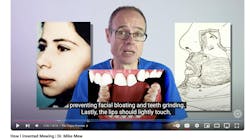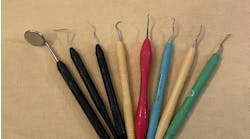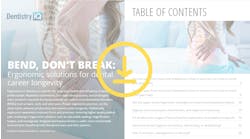By Kevin Henry, Editor
Editor’s Note: I recently had the chance to conduct an interview with Heliane Canepa, the chief executive officer of Nobel Biocare. Her company has been one of the leaders in the dental implant revolution, and I think you’ll find her comments about the present and future of implants very insightful.
Kevin Henry: How do you feel the profession’s and public’s view of implants has changed over the last decade?
Heliane Canepa: Interest in treatment solutions with dental implants has grown significantly over the last decade, particularly in the United States, and continues to remain strong because of patient demand. Consumers, led by the Baby Boomer generation, are now more informed about their options and no longer accept invasive, painful, and time-consuming procedures when there are alternatives. A beautiful smile, once thought to be reserved for the rich and famous, is now within reach of every person. Even more important, dental implants now offer individuals a complete set of fully functioning teeth, along with the nutritional health benefits that accompany them, throughout their lives.
Now that consumer demand is growing, dentists are more interested in learning about the new tools and procedures to help them place and/or restore implants. With the advanced treatments available today, the dental profession is finding that dental implants equate to safer, faster, and more predictable tooth replacement that increases patient comfort and clinician convenience.
KH: How has your company and the implant industry evolved over that same time span?
Heliane Canepa
HC: The dental implant industry has evolved to deliver innovative esthetic dental solutions based on science with a strong focus on the patient. In the 1950s, Professor Per-Ingvar Brånemark discovered osseointegration during research he was conducting on the anatomy of human blood cells. Brånemark observed that titanium integrated with living bone tissue, and he used the discovery to create the first Brånemark dental implant system in the 1960s. Brånemark placed the first dental implant in 1965. Over 40 years later, more than three million people have received Nobel Biocare dental implants. In the early days, the main emphasis was on replacing the function of missing teeth.
Fast-forward to the year 2000 and the emphasis had transitioned from strictly function to esthetics as well. While dental implant solutions were gaining in efficacy and esthetics, they were still associated with multiple visits to the dentist and painful procedures for the patient.
Today, this has completely changed thanks to new advances in the material and technology used to place implants. In 2000, Nobel Biocare introduced TiUnite®, a titanium oxide surface with a porous structure that helps promote faster healing and enhanced osseointegration. It is also designed to improve Soft Tissue Integration™. In fact, dentists can incorporate implants into their practice in a way that provides patients with fast, minimally invasive procedures and functioning teeth, often on the same day of treatment, with a very high success rate and outstanding esthetics.
The dental implant industry continues to rapidly evolve to deliver permanent, fast, minimally invasive, and esthetic replacements for missing teeth. Today, dental implants are becoming as routine as dental prosthetics - both in terms of the dentist-patient decision to go forward with treatment and the actual delivery of it.
KH: If a dentist is still unsure about whether he or she should be doing implants, what would you say to him or her?
HC: Modern dental implants have been around for 40 years and an abundance of studies show success rates routinely above 97 percent. We know that dental implants dramatically reduce bone resorption when compared to the conventional treatments and, in the case of a single missing tooth, provide a solution without having to cut down healthy adjacent teeth as one would for a 3-unit bridge. Studies, such as the Dr. Jocelyne Feine, et al, work out of McGill University, also suggest that patients enjoy a higher quality of life, greater self-confidence, and a better nutritional state when conventional dentures are replaced with implant-retained overdentures. There is sufficient evidence-based research, knowledge, and experience within dentistry today to make an informed decision about dental implants and whether they offer a better standard of care for one’s patients.
In order to facilitate the incorporation of dental implants into one’s practice, Nobel Biocare has made it a mission to simplify the placement and/or restoration of implants in order to give dentists and laboratory professionals more choices than ever before, and in a way that will maximize the productivity of the practice.
NobelGuide™, for instance, offers both clinical and esthetic benefits to patients and economic benefits to dentists. For the patient, the solution promises a nearly trauma-free surgery, less time in the dentist’s chair, and a shorter overall course of treatment - in many cases an immediate end-result can be achieved. From the practitioner’s perspective, the substantially faster procedure and fewer patient visits should enable their practice to handle a higher volume of patients and, based upon a treatment protocol that is more acceptable to the patient, the NobelGuide approach should help to expand the market for dental implants as well. Furthermore, the procedure is safe and predictable - which means more positive outcomes and happy, healthy patients.
All dentists should participate in continuing education programs to stay current on implant technologies and procedures. Not all general dentists will be placing implants for fully edentulous patients, but if a general dentist has the proper level of training, could he or she place a basic single implant? Absolutely. In many other cases the general dentist may only wish to adopt implant dentistry in a restorative capacity. Either way, the basic concept is to transition treatment planning from 3-unit bridges, partial or full dentures, to solutions that provide a more permanent and healthy outcome - it is ultimately about providing the right solution for the patient. Nobel Biocare thinks continuing education is critical to improving patient care. We are currently hosting the Nobel Biocare World Tour 2006, which presents continuing education opportunities to dental professionals in 17 different cities in Australia, Asia, Africa, Europe, and the Americas. Conferences such as these provide participants with a forum in which to share their professional skills and experiences with each other.
KH: You estimate the overall implant market growth at 18 to 20 percent. Do you see that continuing in the near future? Why or why not?
HC: Yes, I believe the market will continue to grow at current levels. Why? Because the patients are going to drive it and the overall need is substantial. A Harvard University study by Douglass, et al, showed the U.S. fully edentulous demographic to currently be in the range of 35 million Americans, with an expected peak in the year 2020 at about 38 million Americans. It is also generally reported that another 65 million Americans are missing one or several teeth. That is 100 million Americans combined, yet only about 1 million implants were placed in the U.S. last year! So the available market is enormous, and studies indicate that dental implants are indeed the fastest growing sector in dentistry. Nobel Biocare proved this in 2005 by outgrowing even the most aggressive market growth estimates by about 4 to 6 percent. While overall dental health may be improving in the population, longer life expectancy is creating a greater opportunity for dental disease in later stages of life. Baby Boomers are an affluent population that is very concerned with quality-of-life issues and appearance.
With our unique C&B&I based on the core concepts of Immediate Function™, Soft Tissue Integration™, and Easy Esthetics™, we are in a position - together with our partners, the dentists and technicians - to continue to deliver top-quality tooth restorations. Some parts of the world have a long tradition of implants, including Europe. As the technology continues to evolve delivering faster, more comfortable procedures with top-notch esthetics, dental implants are quickly becoming the standard of care. In fact, the fastest growing segment of the implant market is North America.
KH: You mention in a recent letter the fact that there are 240 million people in the Western world missing a single tooth or more. What do you feel is the key message about implants that these people need to hear in order for them to accept implant treatment?
HC: Even though an estimated 240 million people in the Western world are suffering from missing at least one tooth, tooth loss continues to be a taboo topic in society, particularly with the fully edentulous. As a result, many patients are still not aware of the solutions available today. Information is key for consumers in today’s society. Nobody should have to die with their teeth in a glass of water next to their bed.
When you start losing teeth, more health problems follow, particularly due to lost bone over time and poor nutritional intake. At one time, dental implants were considered a last resort for patients. Today, they are considered the best treatment for missing teeth, because of the lifetime results with no loose parts or required periodic adjustments, a very high success rate and the higher esthetic results one can get with an implanted tooth. The actual procedure to surgically place a dental implant is done under local anesthesia and can be delivered through a minimally invasive approach. So what is the message these individuals in need must receive in order to accept implant treatment? Based upon focus groups and interviews with patients around the world, it is clear there are three basic elements to an acceptable dental treatment plan:
- Fast treatment/immediate gratification
- Long-lasting esthetics
- Minimal pain and swelling
Through innovations such as Immediate Function, high end Procera ceramics, and minimally invasive procedures with NobelGuide, we are striving to deliver solutions for tooth restoration that directly address the desires of patients and will thus be acceptable to them.
Nobel Biocare is dedicated to providing solutions that meet dentist’s needs along with the requisite information to help patients make informed decisions about their dental care. But it’s always up to the dentist to decide what can be done for the individual patient and then up to the patient to decide which solution he or she will choose. With the ability to provide Immediate Function™ and beautiful, natural results, Nobel Biocare and its network of dentists and labs can create the healthy smile and functionality that is missing from virtually any patient’s life.
KH: Obviously education is one of the keys to Nobel Biocare’s success. What types of education are paramount to success for your company and the implant industry as a whole?
HC: To address the future demand for dental implants, the dental profession has to be in a position to present and deliver the appropriate solutions. Training and education have been and always will be cornerstones of Nobel Biocare’s strategy. Nobel Biocare is expected to be a leader within the industry, continuing to drive new standards across the board, and we take this responsibility seriously, especially for training and education. This year we are focusing on education for customary model-based and innovative computer-aided approaches to treatment planning.
Nobel Biocare also plays an active role in educating and training dental students and dental practitioners on these state-of-the-art techniques through a variety of methods. In November 2005, Nobel Biocare formed a strategic partnership with the largest, and one of the most influential, dental schools in the United States - the New York University College of Dentistry. Nobel Biocare will help to integrate a dental implant treatment planning and esthetic dentistry curriculum into the NYU pre-doctoral dental education program. This is one of the first dental schools to present implants as the treatment of choice for general dentists-in-training.
A more recent collaboration with the University of Maryland Dental School has brought the school advanced digital technology for sophisticated training that will aid in the development of modern approaches to oral health education, research, and patient care.
In 2006, Nobel Biocare expects to enroll more than 300,000 dental professionals in its training and education courses around the world. Education and training will help contribute to the success of today’s practicing dentists and dental students and ultimately help to elevate the state of patient care, now and for years to come.







